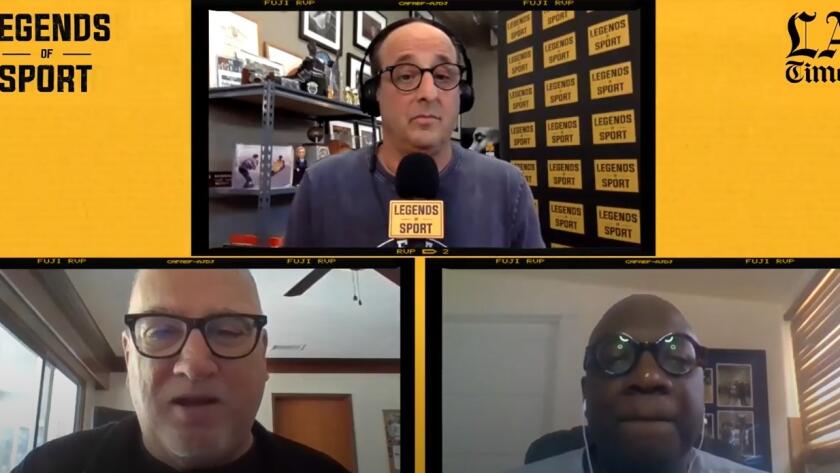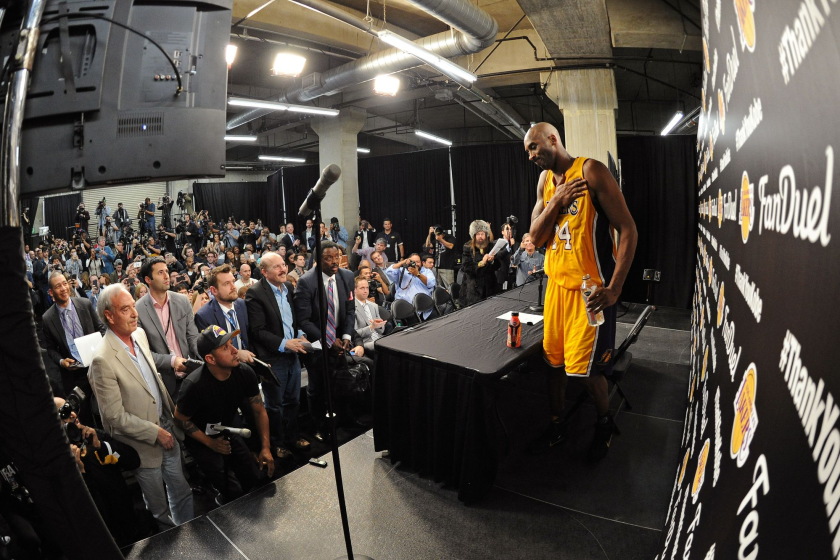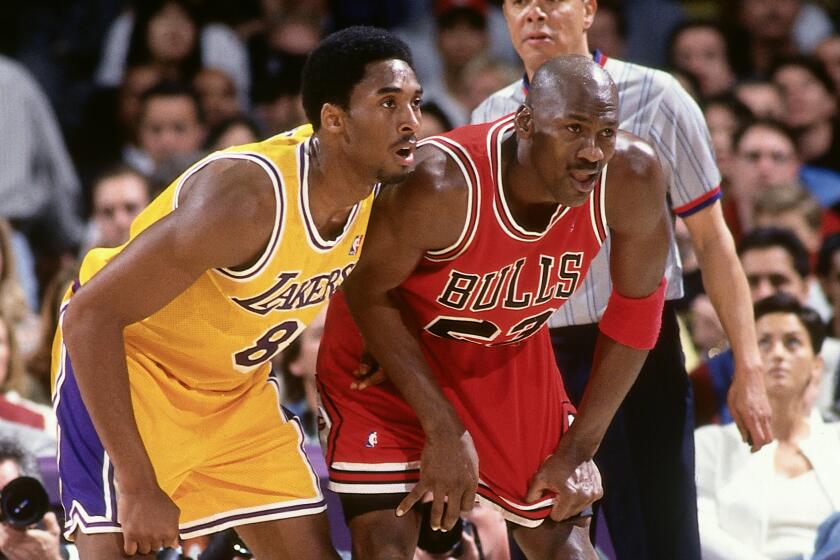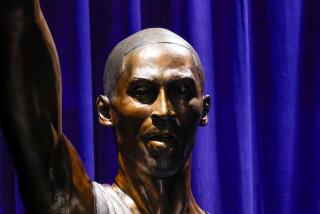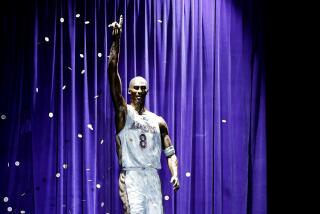The first, bumpy steps in Kobe Bryant’s path to this weekend’s Hall of Fame induction
- Share via
- Share via
This weekend, after a yearlong delay created by COVID-19, Kobe Bryant will be inducted into the Naismith Memorial Basketball Hall of Fame. Throughout the week, The Times will roll out a series of conversations about Bryant with those who played with him, who coached him, who covered him. With those who knew him best.
We launch the series with the Legends of Sport podcast, hosted by Hall of Fame NBA photographer Andrew Bernstein, who co-authored the 2018 book “The Mamba Mentality: How I Play” with Bryant. Bernstein speaks with Times columnist Bill Plaschke and staff writer Broderick Turner — both of whom covered Bryant for the entirety of his 20-year Lakers career — in a wide-ranging conversation that includes their first impressions, the championship years and Bryant’s complicated relationship with Shaquille O’Neal.
The interview, lightly edited for clarity, is excerpted below. You can listen to the full podcast here.
Andrew Bernstein: Bill, do you remember the first time you met Kobe?
All things Lakers, all the time.
Get all the Lakers news you need in Dan Woike's weekly newsletter.
You may occasionally receive promotional content from the Los Angeles Times.
Bill Plaschke: It was during a practice before his first game. The first story I ever wrote about Kobe, a game story, it was really about Shaq. That whole season, 1996-97, was about Shaq. Kobe was just this kid. He was nice and everything, but he was just 17. We had heard about the workout, we had heard about Jerry West loving him and making the big trade, but I can’t overstate that when he came to town how much this was Shaq’s team, Shaq’s town. All of our energy, all of our media focus, was on Shaquille.
Kobe was basically Talen Horton-Tucker and what he is now: kind of a parlor trick, a novelty. It wasn’t until the Utah [playoff] series that first year when people realized this guy is something different, something really worth watching. When I met him, he was like, “Nice to meet you, Mr. Plaschke.” He was just a kid. I didn’t know how long he’d be around.
In a video interview with ‘Legends of Sport,’ the late Kobe Bryant discussed the night he dropped 60 points on the Utah Jazz, then retired after 20 years.
Broderick Turner: The first meeting was really brief. It was during the Summer League, when the Lakers played at Cal State Long Beach at the Pyramid. He had a really good game, but you didn’t think much of it because, as Plaschke said, it was Shaq’s town. It’s July and he’s in the Summer League and he’s doing all these incredible things and the place was packed. But we were still asking, “Where’s Shaq?” when the game was over. We talked to him. He was a very nice young man, but he was still 17. He didn’t turn 18 until that August. I thought “there’s something there,” but that’s all I thought. “There’s something there.”
BP: You have to remember, Kobe lived with his parents. He was a high school kid.
BT: I will say this: If I close my eyes, there were times when I thought I was speaking to Michael Jordan. When we interviewed him [early in his career], we asked ourselves, “Is this MJ?” He had every single nuance about MJ down.
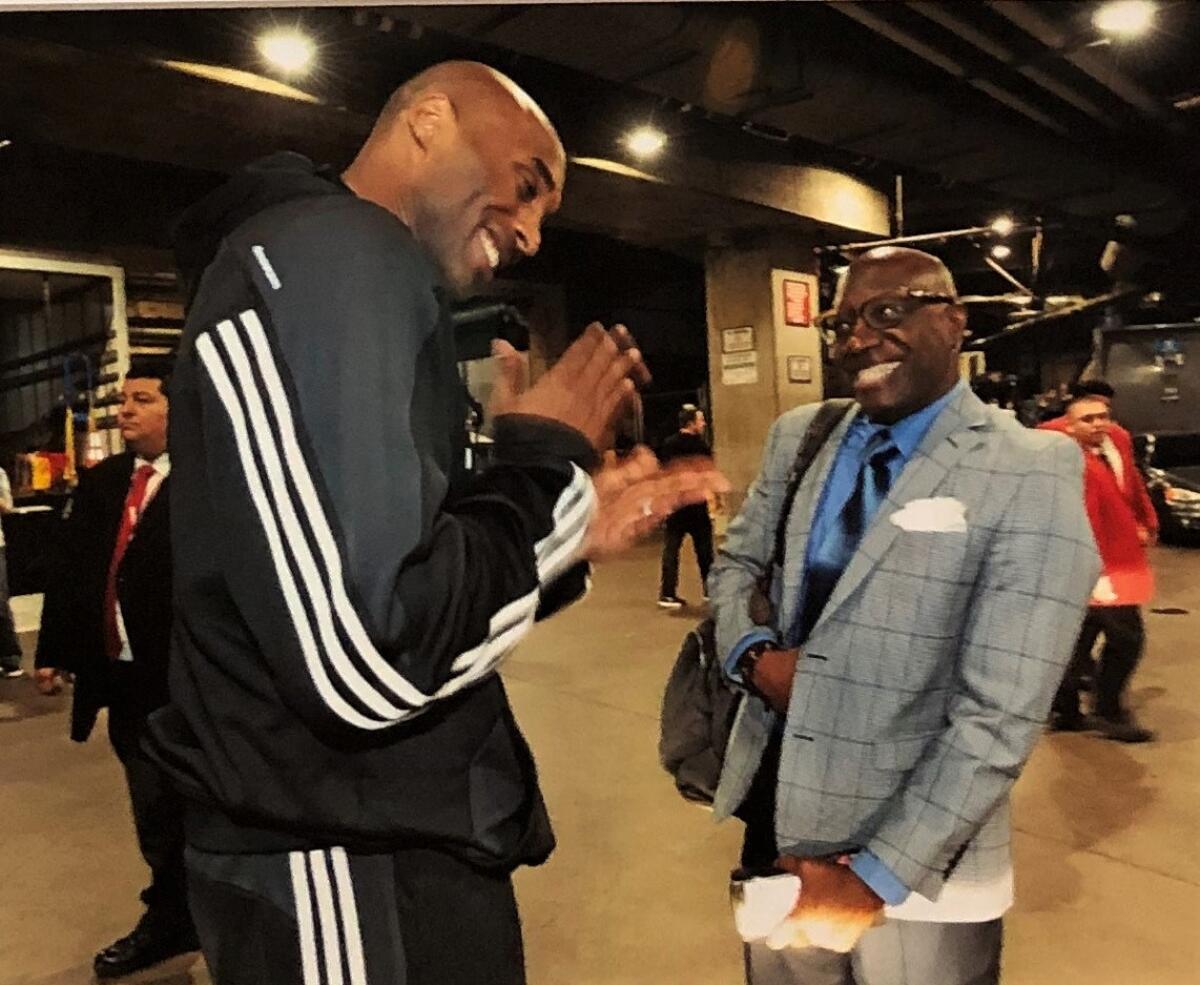
BP: Yeah, I know you sensed something in him, but it wasn’t until he started firing up the airballs against Utah [in the second round of the 1997 postseason] that people realized that this kid really thinks that he can do it all. Sitting courtside that first playoff series against Utah, and you know what it’s like in Utah, the fans are nuts. They’re right on top of you. And they’re screaming and Kobe is shooting airballs. And we’re screaming on press row, “What’s he doing? Get that kid out of there.” [Del Harris] puts him back in and he shoots another airball. And another airball. And another airball. And I think it was then that I realized that this kid is unapologetic, that he has a chip on his shoulder, that he’s not going to take no for an answer.
AB: Two of the enshrinees are going to be guys Kobe played his whole career against. Can you share any story about Kobe going against Tim Duncan and Kevin Garnett?
BT: You know, Plaschke, the one that comes to mind is when the Lakers were playing San Antonio to see who got to go to the NBA Finals. San Antonio won the title in 1999 and Phil called that the “asterisk year” because it was a [lockout-shortened] season. Everyone kept saying, especially our friend Ric Bucher, that San Antonio was the better team. So when they finally met in 2001 in the Western Conference finals, I remember the Alamodome, where Kobe had these incredible games, these monster games, and there was one time when someone missed a shot and Kobe got an offensive rebound between David Robinson and Tim Duncan and scored against those guys, and I want to say he scored something like 45 that game.
B.J. Armstrong played with Michael Jordan and shared an agent with Kobe Bryant. One night he watched the legends lead a master class in basketball.
We knew there was greatness there because we saw it against the Pacers [the year before, when Kobe won his first ring], but this was against San Antonio, the team people thought the Lakers could not beat because they had Tim Duncan, they had David Robinson and they had Gregg Popovich — they were this great team. I just remember Kobe always doing the work against San Antonio and my pal and my buddy, I hope he’s listening to this, Bruce Bowen, getting those Kobe numbers, you got it.
AB: Kobe would say to me, “Andy, do you remember the 2001 conference finals and I went baseline on Bruce and I faked left and went right and dunked on his ass? Do you have that picture? Do you have that one?” That’s how exact he was. He remembered everything.
BP: I remember the Lakers, they played the Timberwolves, what a year was that, it was the 2004 conference finals and Garnett didn’t want to talk after the game. He was walking through the tunnel out to his car and a bunch of us were surrounding him and he was cursing mad. “Kobe’s too good, he’s too good, just can’t get that sumbitch.” Garnett was famous about cursing more than any other player on the court, and he was cursing up a storm that series. Because the Timberwolves never had a chance. Kobe was just too good. And Garnett, it drove him crazy.
More Times conversations about the Hall of Fame career of Kobe Bryant @latimes.com/sports:
Wednesday: Pau Gasol
Thursday: Jerry West
Friday: Byron Scott
More to Read
All things Lakers, all the time.
Get all the Lakers news you need in Dan Woike's weekly newsletter.
You may occasionally receive promotional content from the Los Angeles Times.
